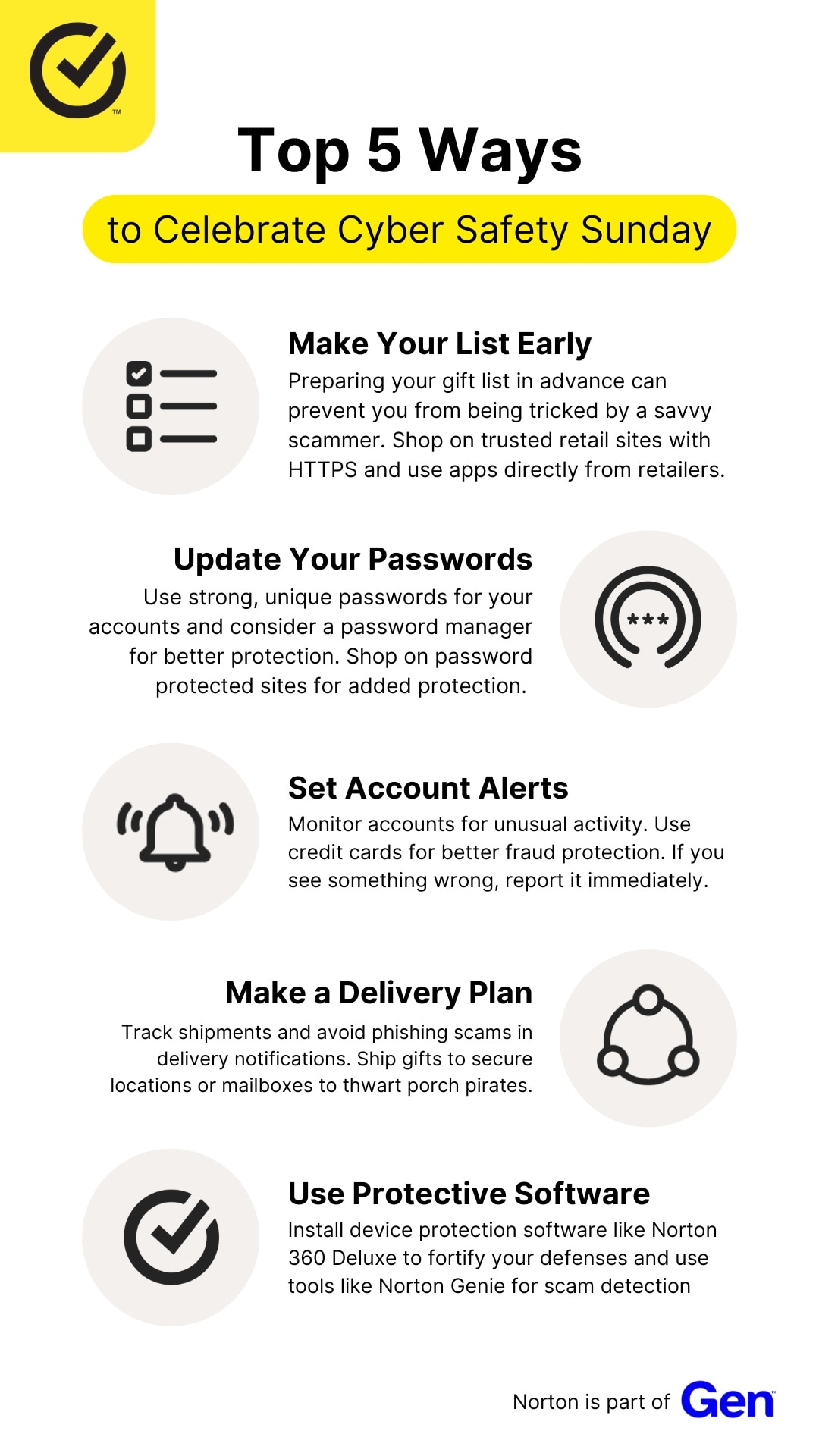Secure your holiday shopping on Cyber Safety Sunday
Check out these Cyber Safety tips to help protect you while you shop online.

Can you feel it? The excitement in the air, the buzz of holiday cheer all around. Like many of us, you’re probably prepping for the season—maybe you’ve put up all your decorations already. And now, your online shopping carts are just waiting for that final click.
Yet, amid the joy of finding the perfect gifts, it’s important to stay vigilant against online scammers who seek to take advantage of unsuspecting shoppers. Want to stay safe online? Mark your calendars for Cyber Safety Sunday on November 30!
Observed the Sunday after Thanksgiving, this holiday was created by Norton to help people learn, not only the risks associated with online holiday shopping, but also how they can help safeguard their personal information.
Let’s dive right in.
Watch out for holiday cyberattacks
Cybercriminals’ schemes have become more sophisticated over the years, especially with the rise of AI technology. Some examples of holiday scams include:
- Phishing scams, such as fake shipping notifications, fraudulent charity requests, gift card scams and discount offers from unknown retailers.
- Counterfeit websites, often involving too-good-to-be-true deals on luxury goods and the top gifts of the season. Watch out for fraudulent offers, like fake holiday contests claiming you've won prizes and exclusive deals requiring payment upfront.
- Fake ads, including those on social media that seem to offer the perfect gift. Scammers are buying ads to place dangerous links in your profile and count on you clicking before you think.
Growing concerns among shoppers
There’s no denying that online shopping can be very convenient. However, money-saving shortcuts, urgency-driven decisions, and overconfidence online are leaving millions vulnerable, especially during the holiday shopping season.
In fact, according to the latest Norton Holiday Cyber Safety Insights Report, nearly two-thirds (62%) of Americans say they're likely to jump on a holiday deal the moment they see it, and often without vetting the source, putting them in scammers crosshairs.
This is why our experts encourage prioritizing your online safety by observing Cyber Safety Sunday. Taking just a few proactive steps can help you head into the holiday shopping season with confidence so you can be more merry and less wary.
Your guide to celebrating Cyber Safety Sunday
Here are five easy ways to participate in Cyber Safety Sunday:
1. Create and review your gift list
Before you start shopping, prepare by creating a detailed gift list, and take note of the websites you plan to visit. Stick to reputable retailers with web addresses that begin with HTTPS. If you’re shopping on your mobile device, use official retailer apps instead of your web browser for added security.
2. Update your passwords
Before officially kicking off your shopping spree, make sure your passwords are strong, unique and up to date for each site. Consider using a password manager to keep track of all your passwords easily. Also, keep in mind that using password-protected sites can add an extra layer of security.
3. Set up fraud alerts for your accounts
Protect your finances by using credit cards for online purchases, as they often come with better fraud protection than debit cards. Set up alerts on your accounts to notify you of any unusual activity and report any irregularities immediately. Go a step further and use identity theft protection like LifeLock to monitor for suspicious behavior.
4. Keep an eye on your deliveries
Monitor what you’ve ordered and when it’s expected to arrive. Ready yourself for the expected holiday season surge in postal delivery phishing scams that can come via text, email, or phone call. To keep your gifts safe from porch pirates, consider shipping to secure locations or using a mailbox.
5. Arm your defenses with technology
Install comprehensive device protection software like Norton 360 Deluxe to help identify and alert you to potential scams. For added peace of mind, you can check suspicious texts, emails, or social media messages with Norton’s AI-powered scam protection that helps quickly identify scams in seconds.

“This Cyber Safety Sunday, I encourage everyone to take just one step towards online security, whether it’s updating your passwords or setting up fraud alerts,” said Iskander Sanchez-Rola, director of innovation for Norton. “These simple actions can make a significant difference in protecting your holiday spirit from scammers”.
Following these five quick and easy tips can help you enjoy a worry-free holiday shopping experience while keeping your information safe. Give them a try.
Stay informed all year round
Check out the Norton website regularly to be in the know when it comes to safeguarding your digital life and staying ahead of other potential scams. If you want to learn more about the latest threats and holiday shopping insights, take a look at the full 2025 Norton Holiday Cyber Safety Insights Report.
Happy Cyber Safety Sunday and a scam-free holiday shopping season to all!
Editorial note: Our articles provide educational information for you. Our offerings may not cover or protect against every type of crime, fraud, or threat we write about. Our goal is to increase awareness about Cyber Safety. Please review complete Terms during enrollment or setup. Remember that no one can prevent all identity theft or cybercrime, and that LifeLock does not monitor all transactions at all businesses. The Norton and LifeLock brands are part of Gen Digital Inc.





Want more?
Follow us for all the latest news, tips, and updates.